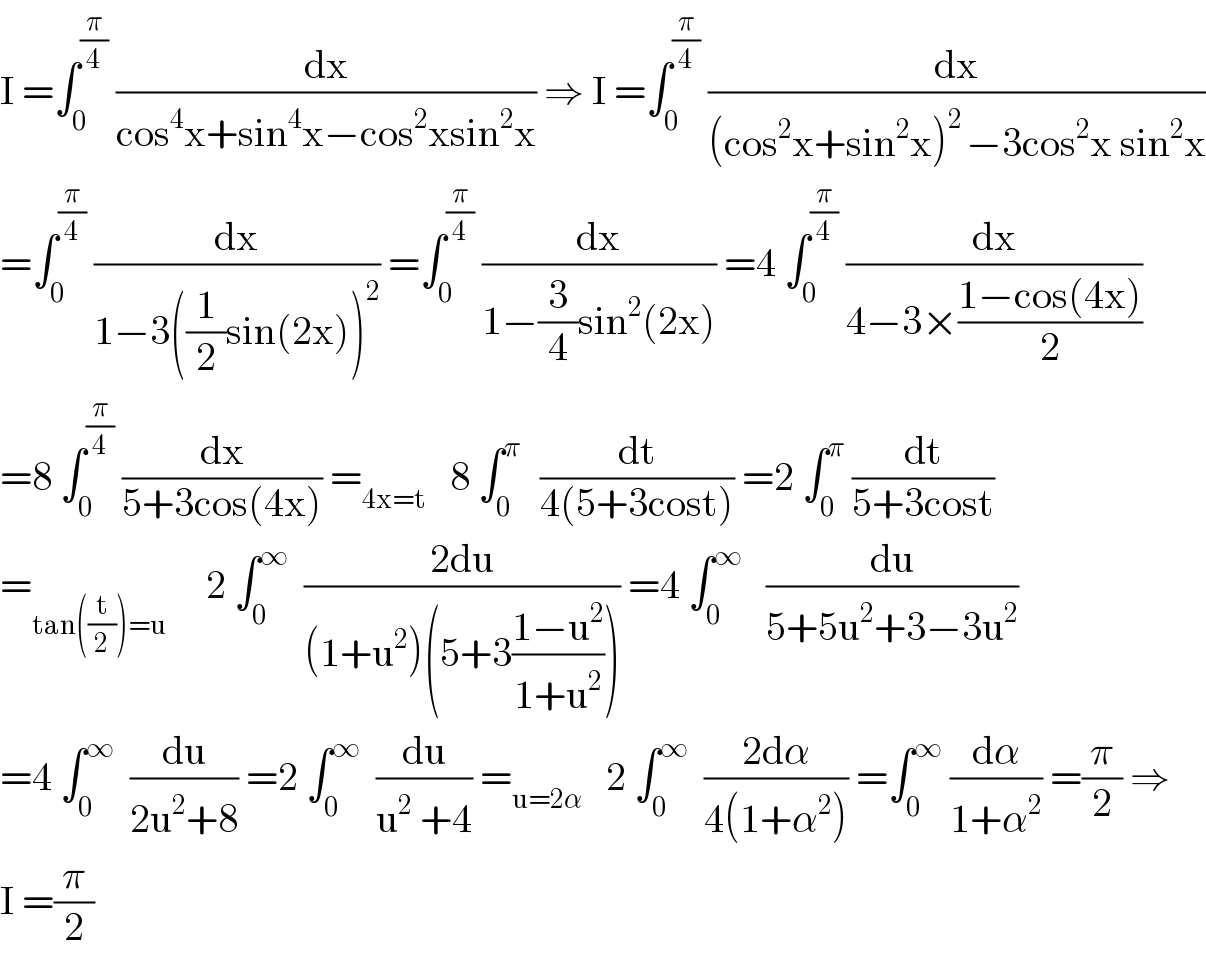Question Number 99516 by 175 last updated on 21/Jun/20

Answered by mathmax by abdo last updated on 21/Jun/20

$$\mathrm{I}\:=\int_{\mathrm{0}} ^{\frac{\pi}{\mathrm{4}}} \:\frac{\mathrm{dx}}{\mathrm{cos}^{\mathrm{4}} \mathrm{x}+\mathrm{sin}^{\mathrm{4}} \mathrm{x}−\mathrm{cos}^{\mathrm{2}} \mathrm{xsin}^{\mathrm{2}} \mathrm{x}}\:\Rightarrow\:\mathrm{I}\:=\int_{\mathrm{0}} ^{\frac{\pi}{\mathrm{4}}} \:\frac{\mathrm{dx}}{\left(\mathrm{cos}^{\mathrm{2}} \mathrm{x}+\mathrm{sin}^{\mathrm{2}} \mathrm{x}\right)^{\mathrm{2}\:} −\mathrm{3cos}^{\mathrm{2}} \mathrm{x}\:\mathrm{sin}^{\mathrm{2}} \mathrm{x}} \\ $$$$=\int_{\mathrm{0}} ^{\frac{\pi}{\mathrm{4}}} \:\frac{\mathrm{dx}}{\mathrm{1}−\mathrm{3}\left(\frac{\mathrm{1}}{\mathrm{2}}\mathrm{sin}\left(\mathrm{2x}\right)\right)^{\mathrm{2}} }\:=\int_{\mathrm{0}} ^{\frac{\pi}{\mathrm{4}}} \:\frac{\mathrm{dx}}{\mathrm{1}−\frac{\mathrm{3}}{\mathrm{4}}\mathrm{sin}^{\mathrm{2}} \left(\mathrm{2x}\right)}\:=\mathrm{4}\:\int_{\mathrm{0}} ^{\frac{\pi}{\mathrm{4}}} \:\frac{\mathrm{dx}}{\mathrm{4}−\mathrm{3}×\frac{\mathrm{1}−\mathrm{cos}\left(\mathrm{4x}\right)}{\mathrm{2}}} \\ $$$$=\mathrm{8}\:\int_{\mathrm{0}} ^{\frac{\pi}{\mathrm{4}}} \:\frac{\mathrm{dx}}{\mathrm{5}+\mathrm{3cos}\left(\mathrm{4x}\right)}\:=_{\mathrm{4x}=\mathrm{t}} \:\:\:\mathrm{8}\:\int_{\mathrm{0}} ^{\pi\:} \:\:\frac{\mathrm{dt}}{\mathrm{4}\left(\mathrm{5}+\mathrm{3cost}\right)}\:=\mathrm{2}\:\int_{\mathrm{0}} ^{\pi} \:\frac{\mathrm{dt}}{\mathrm{5}+\mathrm{3cost}} \\ $$$$=_{\mathrm{tan}\left(\frac{\mathrm{t}}{\mathrm{2}}\right)=\mathrm{u}} \:\:\:\:\:\mathrm{2}\:\int_{\mathrm{0}} ^{\infty} \:\:\frac{\mathrm{2du}}{\left(\mathrm{1}+\mathrm{u}^{\mathrm{2}} \right)\left(\mathrm{5}+\mathrm{3}\frac{\mathrm{1}−\mathrm{u}^{\mathrm{2}} }{\mathrm{1}+\mathrm{u}^{\mathrm{2}} }\right)}\:=\mathrm{4}\:\int_{\mathrm{0}} ^{\infty} \:\:\:\frac{\mathrm{du}}{\mathrm{5}+\mathrm{5u}^{\mathrm{2}} +\mathrm{3}−\mathrm{3u}^{\mathrm{2}} } \\ $$$$=\mathrm{4}\:\int_{\mathrm{0}} ^{\infty} \:\:\frac{\mathrm{du}}{\mathrm{2u}^{\mathrm{2}} +\mathrm{8}}\:=\mathrm{2}\:\int_{\mathrm{0}} ^{\infty} \:\:\frac{\mathrm{du}}{\mathrm{u}^{\mathrm{2}} \:+\mathrm{4}}\:=_{\mathrm{u}=\mathrm{2}\alpha} \:\:\:\mathrm{2}\:\int_{\mathrm{0}} ^{\infty} \:\:\frac{\mathrm{2d}\alpha}{\mathrm{4}\left(\mathrm{1}+\alpha^{\mathrm{2}} \right)}\:=\int_{\mathrm{0}} ^{\infty} \:\frac{\mathrm{d}\alpha}{\mathrm{1}+\alpha^{\mathrm{2}} }\:=\frac{\pi}{\mathrm{2}}\:\Rightarrow \\ $$$$\mathrm{I}\:=\frac{\pi}{\mathrm{2}} \\ $$
Commented by 175 last updated on 21/Jun/20
thank you sir
Commented by mathmax by abdo last updated on 21/Jun/20

$$\mathrm{you}\:\mathrm{are}\:\mathrm{welcome} \\ $$
